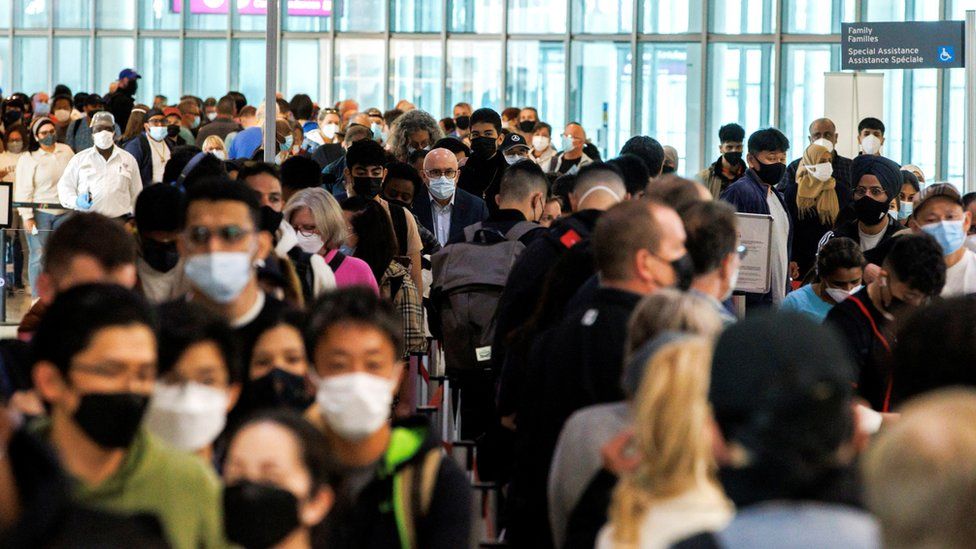ARTICLE AD BOX
By Tara McKelvey
BBC News
 Image source, Reuters
Image source, Reuters
Airports and airlines around the world are struggling to keep up as people begin to travel again in earnest after more than two years of the coronavirus pandemic - but are some travel hubs worse than others?
For four days in a row in early July, Toronto Pearson International Airport - the busiest in Canada, with flights to 155 cities around the world - experienced the most delays of any airport globally.
Flights leaving from Toronto via Air Canada - the country's largest airline - were also the most likely to be delayed or cancelled, according to aviation tracking website FlightAware.
Canadian country music singer Brett Kissel, who's on a North American tour, arrived at the airport with members of his band after a show in Italy in late June.
Their next big concert was several days later in Calgary. They had plenty of time. Then they arrived at the Toronto airport.
"There must have been three or five thousand people there," he said. "Yes, that sounds crazy. But I know what a crowd that size looks like, since I've been on stage, looking out at them."
Almost as bad, the airlines lost their luggage, including guitars that belonged to the band.
Near the baggage claim, he said, were "1,500 to 2,000 suitcases in pyramids".
In despair over the long lines and lost luggage, he ordered a stretch limousine for C$1,000 [$766; £647] for the band and left.
Mr Kissel and his band members were not the only ones to face problems.
Ryan Whitney, a sports podcaster and former professional ice hockey player, posted on Twitter about his Toronto travel nightmare on 6 July, as he was scrambling to get to Boston after a cancelled flight, calling the airport "the worst place on earth".
His voice tense and angry, he said in a video missive that's been viewed over two million times: "I just need to get out of this country, out of this airport."
In May, Canada said it was taking steps to help reduce air travel wait times, including by increasing staffing at major airports.
This month the Greater Toronto Airports Authority, which operates the airport, launched an education campaign for how "passengers and stakeholders" could work together to reduce delays, and acknowledged "various and complex" challenges.
It said in a statement that all industry partners "together must expeditiously implement reforms that will make smoother journeys for the remainder of summer and beyond".
But epic delays, long queues, cancelled flights, and lost luggage is not just an issue in Toronto.
More than 100,000 passengers have been leaving London's Heathrow airport, which is the UK's largest airport and an international travel hub, each day - or trying to.
Flight cancellations have become common, and luggage goes missing.
Image source, Getty Images
Heathrow has apologised to passengers affected by the travel chaos, but has insisted most passengers had a good level of service, despite resourcing challenges at multiple levels.
At Edinburgh Airport, hundreds of bags have been left in a warehouse while airline employees try to sort through a missing luggage backlog.
So why is all this happening?
The Covid-19 pandemic has caused an unprecedented disruption to the industry. Air travel plummeted in response to travel restrictions and other measures, and airlines grounded fleets and laid off workers.
At one point, air travel was down around 90% in the US, according to the country's Transportation Security Administration.
This summer has been an abrupt turnaround.
The number of people who are flying is up dramatically, to nearly the same level as it was before the pandemic.
"We've never before had 50% capacity out of the market and tried to bring it back so quickly," said Laurie Garrow, a civil engineering professor at Georgia Institute of Technology in Atlanta, referring to the airline industry.
"Demand just whiplashed back."
Airline employees - whether at the ticket counter, baggage claim or in the air - have been overwhelmed, especially since staffing is already thin.
Many airport employees, whether baggage handlers or custodians, left their jobs during the pandemic and have not returned.
Kathleen Bangs, a spokeswoman for aviation tracking website FlightAware, said that Pearson is facing the same problem that airports around the world are going through - a shortage of workers.
"Airports are having a hard time getting people to come back to work," she said.
And so, Pearson's rating sank this summer, said Ms Bangs, as did ratings for Liberty International Airport in Newark, New Jersey, LaGuardia Airport in New York, and many other airports in the US and Canada.
Airline executives have scrambled to accommodate the returning passengers - and to manage their expectations for their summer travel.
"Regrettably, things are not business as usual in our industry globally, and this is affecting our operations," said Michael Rousseau, the president of Air Canada, in a late June message to passengers.
Air Canada has drastically reduced the number of flights this summer so they can provide better service on the ones they do schedule. It cut 9,500 flights in July and August, or about 154 per day.
"We are convinced these changes will bring about the improvements we have targeted," Mr Rousseau said, adding "that the real benefits of this action will take time".
Other airlines have made similar decisions.
In truth, few companies, even the nimblest ones, have been able to withstand the bust-and-boom cycle unleashed by the pandemic.
Airlines, like airplanes themselves, are big and unwieldy, and slow to make course corrections.
Mr Kissel and his band eventually got their luggage and their guitars back from the Toronto airport.
When asked whether he would write a song about Pearson, Mr Kissel laughed.
He likes country songs that are upbeat, he said, but when it comes to the airport: "I can only think about several swear words I'd use. I'd probably end up writing a negative song, riddled with a lot of 'F-words'."

 2 years ago
52
2 years ago
52








 English (US) ·
English (US) ·